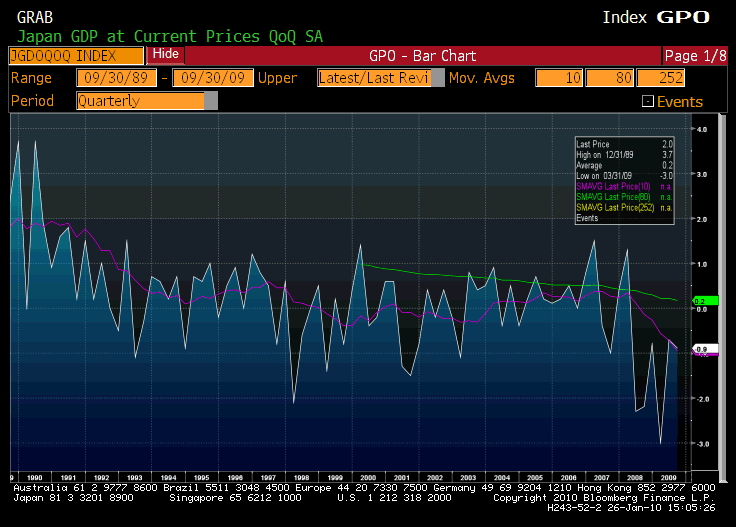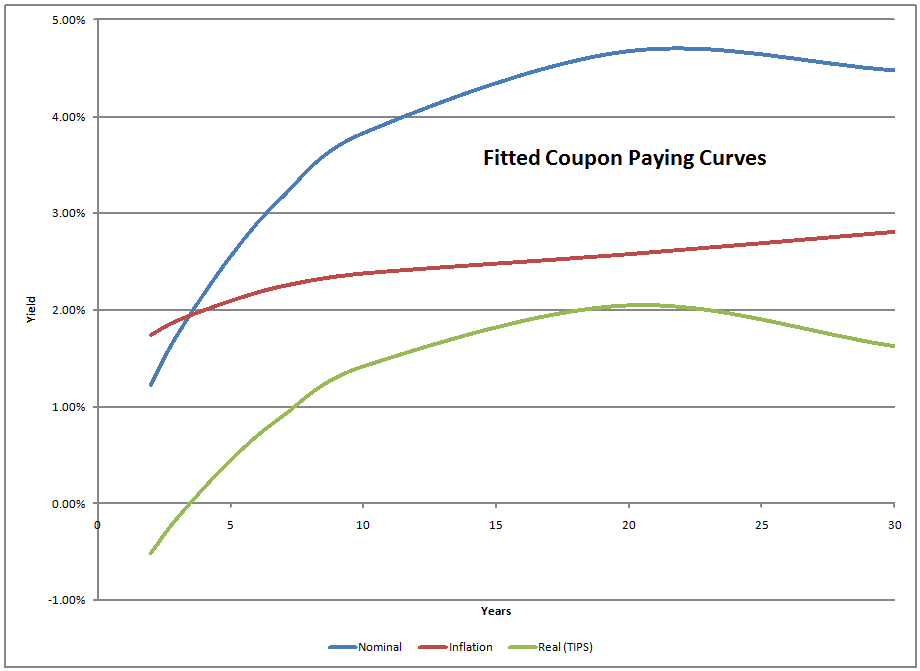Before I begin, I want to tell all of my friends in Japan that I have a great love for their country.? I have not traveled much, but if I were to travel abroad, Japan would be my first choice.? Plus, I have many friends in Kobe, Japan.
Japan is at the leading edge of the demographic wave where many developed countries have a shrinking population.? But beyond that, Japan has high government budget deficits and a very high government debt.? Consider this graph from Bill Gross’ latest missive:

 Japan is in the awkward spot of having high government debt, though much is internally funded, and is still running high government budget deficits.
Japan is in the awkward spot of having high government debt, though much is internally funded, and is still running high government budget deficits.
What a mess.? I happened across a blog I had never seen before today, and it gave a simple formula for when government debts would tend to become unsustainable.? It was analyzing Greece, but I looked at it and said to myself: “What about Japan?”
The main upshot of the equation in the article about Greece is that you don’t want the rate your government finances at to get above the rate of GDP growth.? If so, your debt will increase as a fraction of GDP, even if your deficits drop to zero.
So, what about Japan?? Can we say two lost decades?

Oooch! 0.2%/yr average growth of nominal GDP?!? That stinks.? But here is what is worse.? The Japanese government? finances itself at an average? rate of 0.6%.? The debt is walking backward on them unless GDP growth improves.? No wonder S&P has put Japan on negative outlook.
Japanese interest rates could rise.? Like the US. Japan has an average debt maturity around 5.5 years.? Unlike the US, 23% of its debt reprices every year, which makes them more vulnerable to a run on their creditworthiness.
Here are three more links on the Pimco piece, before I move on:
We can think of central banks as equivalent to a margin desk inside an investment bank in the present situation.? Though I can’t find the data on the web, what I remember from the scandal at Salomon Brothers that led Buffett to take control, there was a brief loss of confidence that led the investment banks margin desk to raise the internal borrowing rate by 3-4% or so. Within a day or so, the trades expected to be less profitable of Salomon were liquidated, and Salomon had more than enough liquidity to meet demands.
But this is the opposite situation: what if the margin desk were to drop the internal lending rate to near zero?? Risk control would be hard to do.? Lines of business and people get used to used to cheap financing fast.? If it were just one firm that had the cheap finance, say, they sold a huge batch of structured notes to some unaware parties, it would be one thing, because after the easy money was used up, the margin rate would revert to normal, and so would business activities.
But let’s expand the paradigm, and think of the Central Bank as a margin desk for the nation as a whole.? Pre-2008, before the Fed moved to less orthodox money market policies, this would have been a more difficult claim to make, but the claim could still be made.
Pre-2008, the Fed controlled only the short end of the yield curve, which, with time, is a pretty powerful tool for making the economy rise and fall.? Short, high-quality interest rates move virtually in tandem with the Fed funds rate, but during good times, with the Fed funds rate falling, economic players seek to clip interest spreads off of longer and lower quality fixed claims, causing their interest rates to fall as well, with an uncertain timing, but it eventually happens.
And when Fed funds are rising, the opposite happens — funding rates for those clipping interest spreads rise, and the expectation of further rises gets built in, leading some to exit their trades into longer and riskier debts, which makes those yields rise as well, with uncertain timing, but eventually it happens.
I like to say that every tightening cycle ends with a crisis.? Let’s see it from an old RealMoney CC post:
One more note: I believe gradualism is almost required in Fed tightening cycles in the present environment — a lot more lending, financing, and derivatives trading gears off of short rates like three-month LIBOR, which correlates tightly with fed funds. To move the rate rapidly invites dislocating the markets, which the FOMC has shown itself capable of in the past. For example:
|
2000 — Nasdaq
1997-98 — Asia/Russia/LTCM, though that was a small move for the Fed
1994 — Mortgages/Mexico
1989 — Banks/Commercial Real Estate
1987 — Stock Market
1984 — Continental Illinois
Early ’80s — LDC debt crisis
So it moves in baby steps, wondering if the next straw will break some camel’s back where lending has been going on terms that were too favorable. The odds of this 1/4% move creating such a nonlinear change is small, but not zero.
But on the bright side, the odds of a 50 basis point tightening at any point in the next year are even smaller. The markets can’t afford it.
Position: None |
Or, these two posts, which you can look at if you want… one suggested that housing was the next bubble (in 2004), and the other critiqued Bernanke’s reasoning on monetary policy.? (Aaron Task has an interesting rejoinder to the latter of these.)
Things are a little different now, because the Fed is not limited to the Fed funds rate any more.? They have a wider array of tools, and the Treasury is in the act as well through the TLG program.? The Fed owns over $1.5 Trillion of longer dated debts, mostly residential MBS.? The Fed as the margin desk has itself become involved in clipping interest spreads, using its cheap short-term funding to buy longer dated paper, directly forcing long rates down.? The Fed may innovate in other ways as well, offering/receiving term financing as well as overnight financing via Fed funds.
But, here’s the rub.? If the Fed brings the margin rate down to near zero and leaves it there, while actively creating expectations that it will stay there “for a considerable period,” and does so in a lesser way for long-dated paper as well, it can manufacture lower interests rates seemingly everywhere for a time.? It’s amazing how fast bond managers can shift from fear to yield lust.? (I leave aside the effects of foreign players for now.)
But as I pointed out in my visit to the US Treasury, you can change the financing rate, but the underlying cash flows don’t change.? The margin desk drops the financing rate, and prior good trades look better, marginal trades look doable, but there are investments that are still losers at a discount rate of zero.? No way to help those.
So what happens when the next crisis arises?? It could be commercial real estate, inflation, a war, a sovereign default (e.g., Greece, Japan, UK, Italy), another wave of corporate defaults, or, a very weak economy, with banks that are willing to clip spreads, but not take any significant financing risks.
Back to Japan.? Two lost decades.? Debt walking backwards on them.? All of the Keynesian remedies they applied.? Government spending and deficits ultrahigh.? Interest rates ultralow.? Start with a government with little debt; end with a government that is the most indebted among developed nations.
This developed world in Bill Gross’s “ring of fire” is pursuing the same strategies that Japan did over the last two decades.? They should expect the same results, until sovereign defaults begin.? Then the game will change — mercantilists like China will see their strategies blow up, and the nations that default will see their living standards decline.
This has gotten too long, but one thing that I will try over the next few days is estimate Nominal GDP growth rates for nations in the “ring of fire,” and their Government’s financing rates.? If I find anything interesting, I will let you know.
Final note: Ben Franklin at the Constitutional convention in 1787 commented that the half-sun on Washington’s chair was a rising sun, not a setting sun.? Though my title plays on a name for Japan, all nations in this predicament may find that their sun is setting as well.? Unwillingness to take short run pain in trading leads to failure in trading — even so, it is the same for nations.







